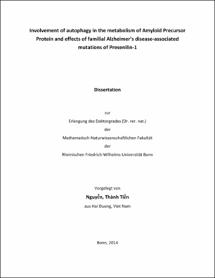Nguyễn, Thành Tiền: Involvement of autophagy in the metabolism of Amyloid Precursor Protein and effects of familial Alzheimer’s disease-associated mutations of Presenilin-1. - Bonn, 2014. - Dissertation, Rheinische Friedrich-Wilhelms-Universität Bonn.
Online-Ausgabe in bonndoc: https://nbn-resolving.org/urn:nbn:de:hbz:5n-38316
Online-Ausgabe in bonndoc: https://nbn-resolving.org/urn:nbn:de:hbz:5n-38316
@phdthesis{handle:20.500.11811/6201,
urn: https://nbn-resolving.org/urn:nbn:de:hbz:5n-38316,
author = {{Thành Tiền Nguyễn}},
title = {Involvement of autophagy in the metabolism of Amyloid Precursor Protein and effects of familial Alzheimer’s disease-associated mutations of Presenilin-1},
school = {Rheinische Friedrich-Wilhelms-Universität Bonn},
year = 2014,
month = dec,
note = {Alzheimer’s disease (AD) is the most common form of neurodegenerative diseases, which is associated with extracellular deposits of the amyloid β-peptide (Aβ) and intraneuronal aggregates of hyperphosphorylated tau protein in the brain. Aβ is generated by cleavage of APP C-terminal fragment β (APP-CTFβ) by γ-secretase. Thus, metabolism of APP-CTF is crucial for amyloid plaque deposition. Although many studies have been focused on understanding proteolytic cleavage of APP and amyloid plaque deposition, less is known about mechanisms that control the cellular metabolism of APP and its derivatives APP-CTFs. Autophagy plays an important role in intracellular protein quality control, especially of long-lived, misfolded and aggregated proteins (Nixon et al., 2008). Dysfunction of autophagy is implicated in the pathogenesis of AD-associated neurodegeneration (Kundu and Thompson, 2008).
This study revealed an important role of autophagy in APP-CTF metabolism by using different autophagic modulations, such as nutrient starvation medium, lipid accumulation, and lysosomal inhibition. In the course of this study, the function of trehalose, which is well recognized as a stimulator of autophagy, has been revisited. Unexpectedly, this study demonstrated rather an inhibitory role of trehalose on lysosomal activity and thus, autophagic flux.
The main project of this dissertation focused on the role of PS1 mutants on autophagy. Mutations in PS1 are the major cause of early-onset familial AD (EO-FAD). Recently, PS proteins have been shown to play role in lysosomal or autophagic capacity. However, these studies used non-neuronal models and the results were controversial. By using various cell models carrying different PS1 variants, ranging from human neurons derived from induced pluripotent or embryonic stem cells to mouse embryonic fibroblasts, the study indicated a decreased turn-over of long-lived proteins or autophagic capacity in FAD-linked PS1 mutant cells. Particularly, PS1 mutants or genetic deficiency reduced autophagic initiation via decreased phosphorylation of Bcl-2, which regulates the interaction with Beclin-1, and thereby decreased autophagosome formation. Additionally, PS1 mutant cells also revealed decreased autophagic flux by impairment of lysosomal function. Thus, the results support the hypothesis that autophagy is defective in AD brains, and elucidated two distinct effects of PS1 on induction and completion of autophagy. The findings further indicate that autophagy is an interesting targeted for therapeutic or preventive strategies in AD treatment.},
url = {https://hdl.handle.net/20.500.11811/6201}
}
urn: https://nbn-resolving.org/urn:nbn:de:hbz:5n-38316,
author = {{Thành Tiền Nguyễn}},
title = {Involvement of autophagy in the metabolism of Amyloid Precursor Protein and effects of familial Alzheimer’s disease-associated mutations of Presenilin-1},
school = {Rheinische Friedrich-Wilhelms-Universität Bonn},
year = 2014,
month = dec,
note = {Alzheimer’s disease (AD) is the most common form of neurodegenerative diseases, which is associated with extracellular deposits of the amyloid β-peptide (Aβ) and intraneuronal aggregates of hyperphosphorylated tau protein in the brain. Aβ is generated by cleavage of APP C-terminal fragment β (APP-CTFβ) by γ-secretase. Thus, metabolism of APP-CTF is crucial for amyloid plaque deposition. Although many studies have been focused on understanding proteolytic cleavage of APP and amyloid plaque deposition, less is known about mechanisms that control the cellular metabolism of APP and its derivatives APP-CTFs. Autophagy plays an important role in intracellular protein quality control, especially of long-lived, misfolded and aggregated proteins (Nixon et al., 2008). Dysfunction of autophagy is implicated in the pathogenesis of AD-associated neurodegeneration (Kundu and Thompson, 2008).
This study revealed an important role of autophagy in APP-CTF metabolism by using different autophagic modulations, such as nutrient starvation medium, lipid accumulation, and lysosomal inhibition. In the course of this study, the function of trehalose, which is well recognized as a stimulator of autophagy, has been revisited. Unexpectedly, this study demonstrated rather an inhibitory role of trehalose on lysosomal activity and thus, autophagic flux.
The main project of this dissertation focused on the role of PS1 mutants on autophagy. Mutations in PS1 are the major cause of early-onset familial AD (EO-FAD). Recently, PS proteins have been shown to play role in lysosomal or autophagic capacity. However, these studies used non-neuronal models and the results were controversial. By using various cell models carrying different PS1 variants, ranging from human neurons derived from induced pluripotent or embryonic stem cells to mouse embryonic fibroblasts, the study indicated a decreased turn-over of long-lived proteins or autophagic capacity in FAD-linked PS1 mutant cells. Particularly, PS1 mutants or genetic deficiency reduced autophagic initiation via decreased phosphorylation of Bcl-2, which regulates the interaction with Beclin-1, and thereby decreased autophagosome formation. Additionally, PS1 mutant cells also revealed decreased autophagic flux by impairment of lysosomal function. Thus, the results support the hypothesis that autophagy is defective in AD brains, and elucidated two distinct effects of PS1 on induction and completion of autophagy. The findings further indicate that autophagy is an interesting targeted for therapeutic or preventive strategies in AD treatment.},
url = {https://hdl.handle.net/20.500.11811/6201}
}






